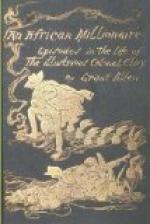We got tickets to view. The invaluable Césarine procured them for us. Armed with these, we drove off one fine afternoon, meaning to go to Planta, by Césarine’s recommendation. Half-way there, however, we changed our minds, as it was such a lovely day, and went on up the long, slow hill to Lebenstein. I must say the drive through the grounds was simply charming. The castle stands perched (say rather poised, like St. Michael the archangel in Italian pictures) on a solitary stack or crag of rock, looking down on every side upon its own rich vineyards. Chestnuts line the glens; the valley of the Etsch spreads below like a picture.
The vineyards alone make a splendid estate, by the way; they produce a delicious red wine, which is exported to Bordeaux, and there bottled and sold as a vintage claret under the name of Chateau Monnivet. Charles revelled in the idea of growing his own wines.
“Here we could sit,” he cried to Amelia, “in the most literal sense, under our own vine and fig-tree. Delicious retirement! For my part, I’m sick and tired of the hubbub of Threadneedle Street.”
We knocked at the door—for there was really no bell, but a ponderous, old-fashioned, wrought-iron knocker. So deliciously mediæval! The late Graf von Lebenstein had recently died, we knew; and his son, the present Count, a young man of means, having inherited from his mother’s family a still more ancient and splendid schloss in the Salzburg district, desired to sell this outlying estate in order to afford himself a yacht, after the manner that is now becoming increasingly fashionable with the noblemen and gentlemen in Germany and Austria.
The door was opened for us by a high well-born menial, attired in a very ancient and honourable livery. Nice antique hall; suits of ancestral armour, trophies of Tyrolese hunters, coats of arms of ancient counts—the very thing to take Amelia’s aristocratic and romantic fancy. The whole to be sold exactly as it stood; ancestors to be included at a valuation.
We went through the reception-rooms. They were lofty, charming, and with glorious views, all the more glorious for being framed by those graceful Romanesque windows, with their slender pillars and quaint, round-topped arches. Sir Charles had made his mind up. “I must and will have it!” he cried. “This is the place for me. Seldon! Pah, Seldon is a modern abomination.”
Could we see the high well-born Count? The liveried servant (somewhat haughtily) would inquire of his Serenity. Sir Charles sent up his card, and also Lady Vandrift’s. These foreigners know title spells money in England.
He was right in his surmise. Two minutes later the Count entered with our cards in his hands. A good-looking young man, with the characteristic Tyrolese long black moustache, dressed in a gentlemanly variant on the costume of the country. His air was a jager’s; the usual blackcock’s plume stuck jauntily in the side of the conical hat (which he held in his hand), after the universal Austrian fashion.




